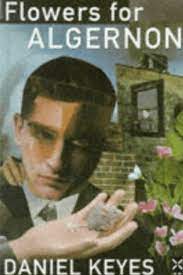‘He that increaseth knowledge; increaseth sorrow’ or in simple terms it’s often said that ‘knowledge is a curse’. Daniel Keyes in his best-known work ‘Flowers for Algernon’ lucidly portrayed humans’ undying urge to evolve themselves intellectually and how that intellect drives men to their deterioration.
Flowers for Algernon is originally a short story and later turned into a novelette. The novelette has also a movie adaptation. It received the Hugo Award for Best Short Story in 1960. The novelette was the joint winner of the Nebula Award for Best Novel, the highest award of America for science fiction novels.
The never-ending conflict between one’s intellect and emotion, between logic and instinct, is portrayed beautifully in this book. It also portrays how past events can influence the present self of a person. This book is an exceptional advertisement of Daniel Keyes’s personal experiences from his early life.
Here’s a short review of this exceptional piece of modern literature.
Book details
| Book Name | Flowers for Algernon |
| Author | Daniel Keyes |
| Language | English |
| Publisher | Harcourt, Brace & World |
| Genre | Short story, Novelette, Science fiction, Epistolary novel, Psychological fiction |
| Pages | 311 |
| Size | 1.71 MB |
| Format | |
| Originally Published | April 1959 (short story) March 1966 (novel) |
Flowers for Algernon PDF
Flowers for AlgernonA Brief Overview
Both the novel and the short story follow the epistolary witting pattern collecting data from Charlies’ (main character) personal diary before the surgery. As the whole story fundamentally revolves around two characters, Charlie and Algernon, it’s important to understand what the characters are about. The character ‘Algernon’, for Charlie, resembles his own identity and struggles, and as for the audience, the mouse symbolizes reality and fate.
The whole story is based upon the character study of the main character Charlie. Here the writer portrays Charlie as a representative of the human mind. Charlie represents the human process to learn, grow, and of acceptance along with human experiences to change, and enlightenment. Charlie is a 32 years old mentally under-developed human being, finds himself in the position to undergo brain surgery that would increase his intelligence exponentially. The surgery procedure has already been done on a laboratory mouse named Algernon, with an exceptional result. Charlie, on the other hand, will be the first human subject of the process.
From the start of the surgery process, Charlie kept his progress report in a diary on a daily basis. Since the novel follows the epistolary writing pattern, the audience can see the sudden surge of intelligence in Charlies’ writing ability after the surgery. Pre-surgery Charlie’s writing is full of grammatical errors and whatnot, but as Charlie’s intelligence surges to a genius-level those mistakes are now gone.
The Deterioration of Charlie
The deterioration of Charlie began with his power of thinking. Charlie was a mentally disabled human being, as soon as he gains a conscience of knowledge, he began to question things, unknown of the great demise that is waiting for him. He began to question life and found the most discussed dilemma of human life, the dilemma of finding meaning. In the lines “why do all of these individuals come to work at Warren (laboratory)?” Charlie reflects on his search for meaning. By this question, the writer portrays not also the genius of Charlie but also the beginning phase of Charlies’ demise.
The unparalleled urge for improvement is also portrayed by the writer when Charlie is challenged to solve a maze against the mouse, Algernon. Algernon repeatedly beats Charlie in the maze game, and then Charlie cited, ‘I hate that mouse’. This shows the absurdity of human needs to satisfy their ego by winning even against a rat.
The last phase of Charlies’ deterioration surge from the conflict between his intellect and emotions. The post-operation Charlie is determined to make the world a better place by making significant contributions to society, while the slow Charlie wants to have his friends back. This dilemma introduces Charlie to the “fatal flaw” of the experiment, ‘hope to salvage anything from his brief stint with a genius for the future’.
The portrayal of the evolution of intellectual horror from self-pity in ‘Flowers for Algernon’ is marvelous. The moral of the novel being, despite the increased intellectual, doesn’t always help humans to evolve as better persons, the splendid portrayal of differences between intellectuality and emotions has taken this novel to a new height.
If you are interested to read this short story or the novel, we can assure you that a great journey awaits.








